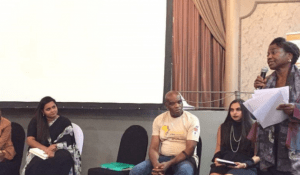Having recently undergone the transition from being an academic for over eight years (oh my gosh, yes, grey strands showing) to becoming more active in the civil society space, I have begun to understand and place value on the concept of “meaningful youth engagement”. The term is often bandied about, and usually given a variety of meanings going from the avoidance of tokenism and checklists in having youth represented on panels; to supporting youth to travel to oh-so-big policy spaces, where they take a few selfies and are then quickly forgotten; and perhaps including them in a development discussion or two. Big strides have been made towards giving substance to the definition of the phrase. My own work in creating a #YouthQuake is an example, but now is not the time for bias, another example is Women Deliver’s discussion paper around seeing youth as partners who are critical for engagement, and the need for power-sharing i.e. being partners.
One of my favourite theorists, Patricia Hill Collins, has written extensively around the matrix of domination/oppression which exists in society. In the case that I will discuss however, the focus will be on the role of youth and gender in the achievement of Sustainable Development Goals (SDGs), particularly in the area of sexual and reproductive health rights (SRHR).
We recently brought academia and activism together around a virtual roundtable, where we were able to have a discussion with young feminists aged 12-25 years. We published a “first of its kind” paper on the meaningful engagement domain, titled Sustainable Development girls: mapping youth advocacy and action to achieve sexual and reproductive health rights in Africa.
Some key findings, which are in line with this year’s theme #PressforProgress of International Women’s Day, provide food for thought, and a good way to spend the day would be to ponder over the powerful and raw words of young feminists in sub-Saharan Africa.
Theme 1: Understandings of gender – light at the end of the tunnel as we move beyond the binary
“Gender should not be limited to being a woman or man instead it is about being a human being,” – Participant 1
Theme 2 – Introspection on critical incidents leading to much needed activism
“There was an instance where I tried to get support from service providers but could not access the health facilities. The major challenge has been the discrimination around being sexually active…as a HIV positive teenager I often would not receive the required treatment.” – Participant 1
“I had an encounter with a nurse when I wanted to do a pap smear. I was just 20 years old at the time and I was at university. I was so discouraged by the poor attitude of the nurse who insulted me by saying that, ‘I don’t need a pap smear or is this because you are sexually active at this young age?’ I actually never received the service nor did I ever return to the facility.” – Participant 2
“When we look at the realities and stigma of menstruation; girls use socks filled with cow dung, I wrote a blog on the issue which an organisation noticed and led to my interest in this area of SRHR.” – Participant 3
Theme 3- the most vocal, was exploring how the matrix of oppression works in society (being a young female) and the likelihood of achieving gender equality, SRHR and the broader development agenda
“The SDGs are nothing but commitments and policies, they won’t be achieved because youth are forgotten and not involved in processes.” – Participant 1
“I think it is unlikely that we will achieve the SDGs, the drawback is that there is still too much patriarchy and men are essentially more powerful than women.” – Participant 2
“SDG-wise, we are trying, but the future is not bright and that is why I am an activist to change the future.” – Participant 3
Now I’m not as young as the 16-27 year old activists with this bleak view and experiences, but even with a PhD and a long list of accolades and renown for public speaking (hey, maybe some would reckon even beating Paul Farmer, ahum), I was recently invited to a so-called panel with the UN Youth Envoy where more senior participants were given the platform on stage, while the youth were told to stand in a line. Being an Emerging Voice and also obviously a revolutionary, I challenged the status quo and stated “I was invited to a panel with the UN Youth Envoy so I am going to pick up my chair and be part of this panel” [see Youtube ].
I gate-crashed the panel, as you can see, but the truth is that even with all the hype and buzz around meaningful engagement, there are still many significant and noticeable gaps, more so for the many women in our spaces. So, perhaps, there is not too much to celebrate as yet.

Picture Africa Conference on Sexual Health and Rights (2018): United Nations Youth Envoy (Jayathma Wickramanayake), Shakira Choonara and Executive Director of the United Nations Population Fund (Dr Natalia Kanem)
Reference: Choonara, S. Banda, R. Chitimira, R.Ditsele, G.
Hwengwere, M. Magwenzi, T. Phiri,C. Simelane, Z. Masikati, I. 2018. Sustainable Development girls: mapping youth advocacy and action to achieve sexual and reproductive health rights in Africa. Agenda. https://doi.org/10.1080/10130950.2018.1427812